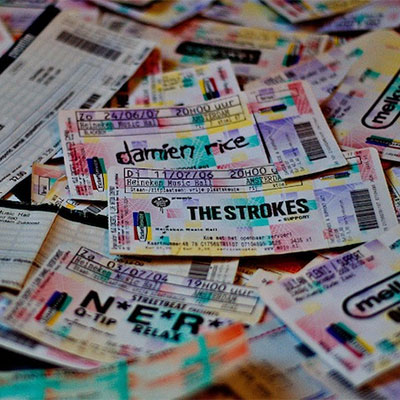
by Gideon Gottfried

Technology has made the world a more democratic place. Many traditional structures are becoming increasingly superfluous, especially in the music industry. Artists have endless possibilities to make contact with their fans these days. The key? Do It Yourself (DIY). The meaning of this term has gradually changed over the years. When the digital age first gathered momentum and everyone was talking about Web 2.0, many people thought that the DIY approach really involved artists taking everything into their own hands: promotion, business, tour planning, alongside being creative and writing songs too! However, musicians need space in order to really develop their art. If the creative geniuses behind our favorite albums had had to organize their own promotion and plan their own tours alongside writing and recording songs in the studio, who knows if the albums would have turned out as well as they did. Entrepreneur and author Derek Sivers recently came up with a new definition of DIY, calling it Decide It Yourself: this reflects the fact that artists have a lot of choice between various services these days, which can take over important duties on behalf of the musician. The businesses fulfilling this role really think of themselves in these terms: as service providers for artists.
The biggest music companies have always said that the artist was the most important thing. This was often just a façade, as the companies really fought to maintain their profits and power. These days people who want to make money in the music business (i.e. not as a creator) can’t get away with that sort of empty phrasing. The artist is at the center, and any music company that wants to succeed today should recognize that this is a crucial concept. It doesn’t mean that big labels never invested any money in building artists’ careers, but their view to profit constantly controlled things, as specified in the fixed shares given to artists by their contracts. This era is now over.
Introducing: Gigstarter
Digital Distributors like iMusician put artists’ songs into all the relevant digital music shops worldwide. With the help of a social media expert too, artists can make great progress with a minimal promo budget. There are also constant developments in the live industry, with great new ideas that use technology to make life easier for the artist. One company practicing this artist-centric philosophy is Gigstarter. To call it a crowdfunding platform for concerts would be to miss the mark slightly. Unlike other crowdfunding platforms, Gigstarter prefers to stay behind the scenes. While artists using Pledge music, Kickstarter, Startnext etc. have to mobilize their fans to find the respective platform and donate on that page, Gigstarter remains hidden in the background – neither the artist nor the fans realize that they are interacting with each other via a third party."Where should I play?"
The way in which Gigstarter works is simple: an act wants to go on tour, so they ask their fans where the band should play live via social media channels. Every artist’s Gigstarter campaign begins with the question: “Where should I play?” For example, the singer David Gray mobilised over 10,000 fans from Ireland via Facebook. They generated a total 21,000 ticket requests for shows across Ireland via word of mouth, for concerts that had not yet even been confirmed. This high level of demand led on to a media campaign, without a single penny of investment.As an artist, you decide how many tickets are needed where and when in Gigstarter’s front-end. In the back-end, a whole tour plan is automatically produced. Newcomers like the band Join Me In The Pines used this method to plan their first tour risk-free, without having to worry whether venues would be full or not. They only played where enough audience members were already guaranteed.
Regarding venues - the owners of small, unknown venues can also potentially reach out to new audiences by working with Gigstarter. Firstly because artists will start to play gigs in places that they would never previously have considered, as they didn’t even know they had fans there. As the fans decide where the artist should play, even small villages that hardly appear on the map can become part of a tour. For example, David Gray found out from Gigstarter that he had more fans in the Irish city of Cork than he did in Dublin, although Ireland’s capital has five times as many inhabitants as Cork.
A business model for everyone
A business model like Gigstarter is not just aimed towards newcomers or indie artists. Any act would welcome the idea of risk-free touring with open arms, regardless of how famous they are. A tour planned with Gigstarter only begins when all of the costs are covered – it sounds almost too good to be true, but that’s the reality being offered here. However, Gigstarter is not just about minimizing risk. It also deepens the relationship between artist and fan. Anyone who has been following the debates around new business models in the music industry (such as streaming – see “Streaming: Time To Think of a new Payment Structure”) knows how important it is for musicians to remain in contact with their fans, turning them into superfans. Superfans are the people who will spend more than the average amount on their favorite musicians. Superfans would buy a box set for £200, spend crazy amounts on VIP tickets, and are the top supporters for any of their idols' crowdfunding projects. Superfans feel honored if they are asked via Facebook where their star should next stop off to play a show. They will mobilize their family and friends in order to see this act play in a venue nearby. Superfans are the best promoters that an artist could wish for. Gigstarter helps artists to identify these fans and mobilize them. You have to register by email in order to buy a ticket via Gigstarter. This sort of data is enormously useful to artists, who can use it to write to their fans directly.Gigstarter also keeps six percent of every ticket sold. To be more precise, Gigstarter keeps six percent of the total sales, as the model has long since developed away from ticket sales alone, including new ideas such as merchandise Bundles. David Gray sold an exclusive poster and ticket bundle, for example. Anyone who paid the slightly higher price for the bundle was able to collect his or her poster at the show. “In the future, we want to sell personalized merch,” said Donal Scannell, Gigstarter’s founder, and CEO. If you compare the six percent that Gigstarter receives with the business and sales fees that were previously common, one thing is clear: in this case, the company recognizes its place in the music business hierarchy. Donal Scannell admits that he would like to demand a higher percentage from the larger acts who can sell a huge number of tickets at relatively high prices in the future if they use Gigstarter’s services. He essentially considers himself to be an enabler, who gives artists wings – artists who want to invest time and energy in mobilizing their fans of course. Without the dedication and hard work, you would only benefit from a fraction of Gigstarter’s potential power.
Gigstarter is still testing out its model with selected partners. The business will officially launch in June. One major record label is already using Gigstarter to plan tours for newcomer acts. Labels can use this method to convince people about new artists’ potential with less risk involved. It’s clear that the existing structures in the music industry won’t immediately cease to exist because of the digital revolution. Scannell insists that nobody is starting a war against more traditional models. However, it would be good for heads of these traditional models to accept that they are not at the center of the universe – that they can achieve nothing without the artists they represent. Major labels are essentially just service providers too, but this seems to have been forgotten a long time ago. The live music industry is the most important part of a musician’s income these days. Gigstarter gives artists access to this important sector, whether they have the support of a label backing them or not.

Ready to get your music out there?
Distribute your music to the widest range of streaming platforms and shops worldwide.


